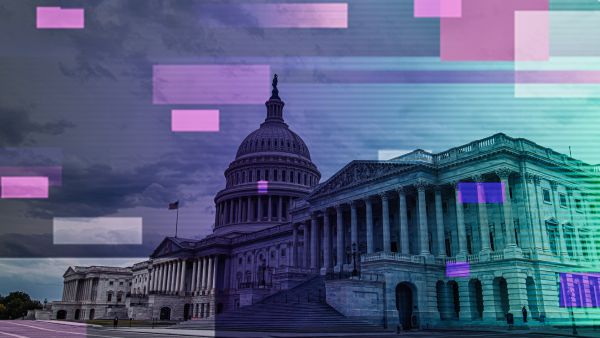
In This Newsletter
Digital Asset Legislation Update
Open Banking and Rule 1033
Global Crypto Adoption
Digital Asset Legislation Update
The Guiding and Establishing National Innovation for Stablecoins (GENIUS) Act, signed into law in July 2025, marked the first-ever federal legislation on cryptocurrency. The legislation requires dollar‑pegged stablecoins to maintain full backing with high‑quality liquid assets, prohibits interest or staking rewards, mandates monthly reserve disclosures, and subjects issuers to oversight under the Bank Secrecy Act.
The GENIUS Act enables greater institutional participation in USD stablecoins for payments. Major retailers, including Walmart and Amazon, were already considering launching payment stablecoins to realize the speed and cost efficiencies of the technology, potentially taking payments activity away from banks and the traditional financial system, the Wall Street Journal reported.
Also in July, the House passed the Digital Asset Market Clarity (CLARITY) Act, which outlines broader digital asset market-structure reform. The act clarifies trading venue jurisdiction, delineates Securities and Exchange Commission vs. Commodities Futures Trading Commission oversight, introduces interoperability and custody standards, and includes provisions on trading intermediaries. Milken Institute Finance Executive Vice President Michael Piwowar testified before the House Agriculture Committee this June on the importance of building out a comprehensive digital asset market structure. The Senate Banking Committee has released a Market Structure Discussion Draft and issued a request for information from the public.
The Milken Institute released a statement supporting the new legislation. “Stablecoin issuers have historically operated in an environment with patchwork regulations that produce stablecoins of varying quality. The absence of an overarching regulatory framework posed real risks to our banking system, retail investors, and innovators,” said Nicole Valentine, FinTech director. “The passage of the GENIUS Act will enable a safer, more transparent, and more trustworthy cryptocurrency market by implementing explicit reserve requirements, regular reporting, and consumer protections.”
Open Banking and Rule 1033
Section 1033 of the Dodd-Frank Act, commonly referred to as “Rule 1033,” gives consumers the right to access and share their financial data with secure application programming interfaces (APIs). Under the Biden administration, the Consumer Financial Protection Bureau (CFPB) passed final rulemaking to prohibit fees on third-party data sharing, set to take effect in 2026.
Under the CFPB’s proposed ruling, banks with assets over $850 million support data access at no cost. The rule also prohibits data-gathering measures such as screen‑scraping. It enables authorized FinTech firms to access consumer‑permitted account and transaction data through standardized APIs. Although the rule is not currently in effect, banks have not charged fees for third-party data sharing in the post–Dodd-Frank era, laying the groundwork for the development of an open banking ecosystem over the past decade.
The open banking ecosystem centers on API providers and data aggregators such as Plaid, Pontera, Finicity, and Yodlee. These firms enable FinTech applications—including budgeting tools, payment initiators, lending platforms, and account aggregators—to access consumer-authorized data. They facilitate data sharing across traditional FinTech, neobanking ecosystems, and the broader digital assets industry.
Recently, API providers have raised alarms as the economics underpinning the industry have begun to shift. Reuters and the Financial Times [SM11] report that JPMorgan plans to charge new data-access fees to FinTechs—fees that aggregator firms warn could amount to 60–100 percent of annual revenue. Forbes reports that banks are seizing on a weakened CFPB to generate revenues from what has become a lucrative industry for data aggregators. Legal challenges are underway, with banks and trade groups arguing that Rule 1033 exceeds CFPB authority. Regulatory uncertainty around these fees could threaten consumer data portability and investment across the FinTech sector.
Milken Institute Insights on Global Crypto Adoption
The FinTech Program released its first two publications in a series that will cover digital asset use and adoption in Latin America, sub-Saharan Africa, and Southeast Asia. The research, conducted in partnership with Professor Jens Rudbeck at the New York University School of Professional Studies, Center for Global Affairs, examines how digital currency is being adopted in emerging markets, the public policy response to those use cases, and opportunities that digital financial modernization creates.
In Latin America, governments are innovating, investing, and experimenting toward the next generation of digital payments. While not every initiative has been a success—El Salvador has scaled back its national bitcoin ambitions—public infrastructure projects in Brazil and Argentina, such as PIX, Drex, and QuarkID, reflect a growing trend of governments building their own digital rails that could complement or converge with private and public digital currency initiatives globally.
In sub‑Saharan Africa, digital asset adoption has become part of the broader trend away from cash-based economies, driven by the proliferation of digital financial services. The region's focus on stablecoins and mobile-first infrastructure—particularly in Nigeria and Kenya—represents a growing opportunity for global partnerships and economic integration. As digital finance ecosystems mature, they offer blueprints that could help shape inclusive and impactful global standards.